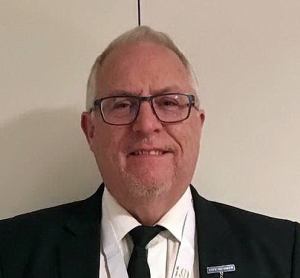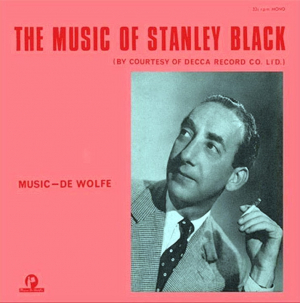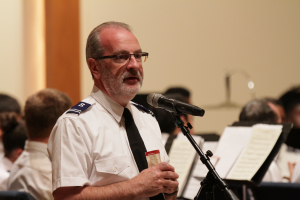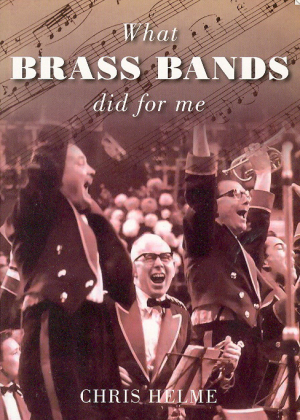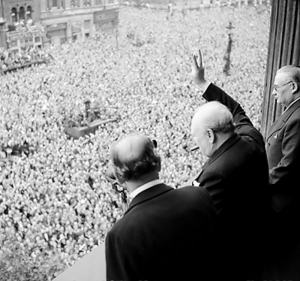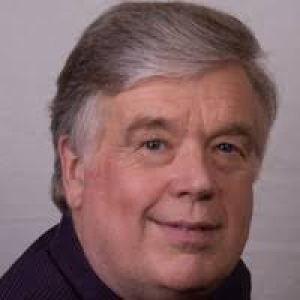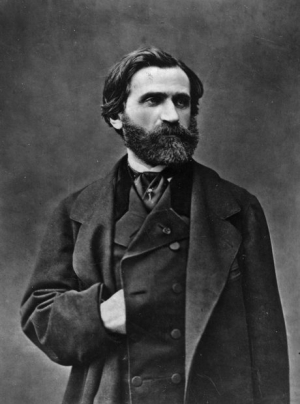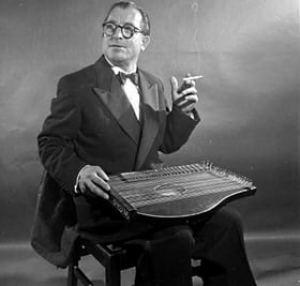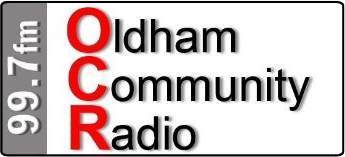
Talk Subjects
Chris Helme
The respected Australian brass musician Mark Ford was awarded the prestigious 2018, Frank Wright Medal, for Services to Music.
The nationally recognised honour was initiated in 2001, with Mark now following in the footsteps of some of Australia’s finest musicians in the banding world.
During his career, he has been a multiple State and National solo champion, led amongst others, the Kew Band to three Australian National and one Australian Open titles, has helped produce numerous award-winning and critically acclaimed CD releases and musical projects, composed works for the medium and been a highly respected adjudicator, teacher and mentor.
His friend and colleague Dr Matthew van Emmerik, the international euphonium soloist and conductor, said that it was a fitting recognition for a musician regarded by many as something of a banding legend. "Mark has been such an inspiration to so many and is rightly regarded by being presented with this award, as a legend.
Not only is he so respected in the field of brass playing, but also across many genres of music and music-making. This is a well-deserved award."
Mark is conducting The Kew Band on this week’s show with Percy Code’s march Manly Shore.
Stanley Black OBE (14 June 1913 – 27 November 2002) was an English bandleader, composer, conductor, arranger and pianist. He wrote and arranged many film scores and recorded prolifically for the Decca label (including London and Phase 4). Beginning with jazz collaborations with American musicians such as Coleman Hawkins and Benny Carter during the 1930s, he moved into arranging and recording in the Latin American music style and also won awards for his classical conducting.
Black was born as Solomon Schwartz on 14 June 1913 in Whitechapel, England. His parents were Polish and Romanian Jews. He began piano lessons at the age of seven. He was aged only 12 when his first composition was broadcast on BBC Radio and continued his early success by winning a Melody Maker arranging competition aged 15.
In the early 1930s he was employed as a jazz player and composer and had worked with Howard Jacobs, Joe Orlando, Lew Stone, Maurice Winnick and Teddy Joyce by the time he joined Harry Roy in 1936. He had also broadcast and recorded with several American musicians, including jazz saxophonist Coleman Hawkins, who had first heard Black on late night radio shows with Lew Stone's band. When the two eventually met in London, the reviewer Edgar Jackson suggested they record together, and a notable collaboration is a duet version of Honeysuckle Rose.
During World War II, Black joined the Royal Air Force, and became involved in managing the entertainment of servicemen based at Wolverhampton. In 1944 he was appointed conductor of the BBC Dance Orchestra, and remained in the job for almost nine years, broadcasting as many as six nights a week.
By this time he had also begun recording under his own name for Decca. Now well involved with the film industry, he went on to compose, arrange and direct music for about 200 more films, notably after being appointed music director at Elstree Studios in 1958. He was also principal conductor of the Associated British Picture Corporation Orchestra and musical director composer of that organisation from 1958-1963.
Stanley Black's radio work kept him in contact with a large listening audience through his incidental music for shows such as Much Binding in the Marsh and the first two series of The Goon Show. He later presented his own programmes on radio and television, including Black Magic and The Marvellous World of Stanley Black.
In the early 1950s he regularly topped the Melody Maker lists of the most-heard musicians on radio. He was chosen to be included on Decca's first release of long-playing records in the UK in June 1950. This enabled him to continue his conducting, arranging and performing and resulted in a large number of albums. He was particularly popular in United States, as evidenced by his inclusion in the Billboard best-sellers lists.
During his life, he conducted many of Britain's major orchestras, and until the 1990s he was still directing regular broadcast sessions at the BBC studios, despite the onset of deafness in later life.
(Courtesy of Chandos Records)
Following on from our themed programme last week this week we have a programme of music that reflects space, the stars, planets, the galaxies, time, flight and space in the movies..
There are pieces of music which many listeners will have played with their own bands or possibly heard some of them at a band concert. We have bands from a number of different countries and some fine soloists on the show.
In two weeks time we will be producing a themed show that represents the sea, rivers and even a canal. If you have any suggestions of music that will fit the theme please contact us on This email address is being protected from spambots. You need JavaScript enabled to view it.
Enjoy the show
This week Sunday Bandstand is playing a themed programme of music, it is to be the first of many in the future. This first programme is titled 'A Russian Festival'. Some of the music you will be familiar with, whilst a number of the tracks may be new to you. It is a mixed programme of music which I am sure you are going to enjoy. The programme features bands from six different countries.
If you would like to suggest a few theme please let us know and we will look at it and see if such a programme is possible for a two hour programme and would hold the interest of a large audience of listeners.
Please note that the theme for next week is titled 'A Space Odyssey'.
Enjoy
Gordon Ward, for 33 years was a member of the New York Staff Band and served over 20 of those years as principal cornet
He first started playing the cornet around the age of seven, and until he went to the Royal Northern College of Music in Manchester, his father was his only teacher.
He did have a great Young Person (YP), Band, to play in growing up at Hull East and later at Stockport Citadel, while studying in Manchester. He found this as a solid grounding in Salvation Army junior and senior banding.
Moving to New York was a huge undertaking and his membership of the New York Staff Band (NYSB) specifically. Having Derek Smith as Bandmaster and aware of his reputation as a cornet player was immense. Before becoming principal cornet in the band, Gordon spent several happy years on soprano cornet.
Looking back over his long career Gordon reflects that sitting in the principal cornet position, or ‘hot seat’, as it’s often referred to, in a band is very different to sitting anywhere else in the section. Not only is solo playing important but leading a section of some four or five individual front row players creates challenges. It is not always easy for players who have their own individual sound and style to be able to blend and work as a team.
In 2007 he brought out a CD with the NYSB accompanying him. A track from the CD titled ‘Forward’ is featured in this week’s – Peter Graham’s Swedish Hymn. A piece that many listeners will be familiar with.
Chris Helme has been involved with the brass-band world for more than fifty years, and this collection draws upon that experience to present a fascinating insight into some of the foremost figures in both their own banding area and the national scene.
What Brass Bands Did For Me is filled with archive photographs, and with contributions from the bandsmen and women themselves, as well as their families, friends and banding colleagues, this book celebrates the triumph and sadness, local life and band life, community success and even national recognition..... £10 + £3 p/p - Published 2009. PLEASE NOTE OVERSEAS POSTAGE WILL VARY PLEASE ASK BEFORE PURCHASE.
Victory in Europe Day is the day celebrating the formal acceptance by the Allies of World War II of Nazi Germany’s unconditional surrender of its armed forces on Tuesday, 8 May 1945, marking the end of World War II in Europe. Several countries observe public holidays on the day each year, variously called Victory Over Fascism Day, Liberation Day or simply Victory Day. In the UK it is often abbreviated to VE Day, or V-E Day in the US, a term which existed as early as September 1944 in anticipation of victory.
Several former Soviet bloc countries like Russia, Belarus, and Serbia celebrate on 9 May. Israel also marks VE Day on 9 May, as a result of the large number of immigrants from the former Soviet bloc, although it is not a public holiday.
Sadly, most of the planned celebratory events have had to be cancelled owing to Covid-19, which will have been a disappointed many people.
In this week's show there is some music that will act as a commemoration for May 8, 75 years ago.
Stephen Roberts was born in London and studied at the Royal College of Music with Alan Civil and composition at Birmingham University. He is a founder member of the FINE ARTS BRASS and has been responsible for many of the Ensemble’s musical arrangements. As well as playing the horn, he is also known as a composer and conductor and has written works for a variety of artists and orchestras, including recent symphonic works for the BBC Symphony Orchestra and English Symphony Orchestra.
He has also written many pieces for the brass band world including concert music and contest test pieces. He is on this week's show conducting the Desford Colliery Band with his own composition American Carnival. A piece that would certainly test the players but one they would certainly enjoy playing equally as much as the audience would enjoy listening to it.
Giuseppe Verdi – (9 or 10 October 1813 – 27 January 1901) an Italian opera composer. He was born near Busseto to a provincial family of moderate means and developed a musical education with the help of a local patron. Verdi came to dominate the Italian opera scene after the era of Vincenzo Bellini, Gaetano Donizetti, and Gioachino Rossini, whose works significantly influenced him.
Verdi was briefly an elected politician. An intensely private person, Verdi, however, did not seek to ingratiate himself with popular movements and as he became professionally successful was able to reduce his operatic workload and sought to establish himself as a landowner in his native region. He surprised the musical world by returning, after his success with the opera Aida (1871), with three late masterpieces: his Requiem (1874), and the operas Otello (1887) and Falstaff (1893).
The Dies Irae is a section from Verdi's Requiem. Dies Irae is Latin for Day of Wrath and it tells of a person coming before God to receive judgement at the end of their mortal life.
When it comes to spine-chilling music, it is hard to beat Verdi's Dies Irae, or 'Day of Wrath'. Verdi's Requiem is an epic achievement in every sense, but this depiction of the day of judgement is pretty unsettling stuff. Turn it up loud. It is on this week’s show and it is a fabulous arrangement by Peter Graham.
Anton Karas (7.07.1906 – 10.01.1985) was an Austrian zither player and composer, best known for his internationally famous 1948 soundtrack to Carol Reed's The Third Man, which came about as a result of a chance meeting.
Born in Vienna, one of five children of a factory worker, Anton Karas was already keen on music as a child. He wanted to become a bandleader, which because of the family's financial situation was impossible. However, he was allowed to learn to play an instrument, as were his two brothers and two sisters. He later reported that his first zither was one he found in his grandmother's attic at the age of 12.
On the order of his father, he undertook an apprenticeship as a tool and die maker at the age of 14, while also taking evening courses in music at a private institution. He successfully finished his apprenticeship in 1924 and worked in a car-factory until becoming unemployed in January 1925. Having already begun to study at the University of Music and Performing Arts, Vienna in 1924, he subsequently earned his living as an entertainer in a Heuriger (a wine bar, typically with a garden, usually selling the year's new wine) and soon found himself earning more income than his father. He continued his studies until 1928.
In 1930, he married, with the birth of his daughter following three months later. From 1939 to 1945 he was with German Wehrmacht anti-aircraft warfare, temporarily in Russia, where he also took a zither along. He lost more than one instrument from war action but always managed somehow to find another one.
In the summer of 1948, director Carol Reed was preparing to shoot The Third Man in Vienna and was staying in the Hotel Sacher, along with many of the British element of the Allied Control Commission for Austria. Robert Baty, the young son of the Director of Education, C.W. Baty, was given the task of showing the director around the city. On the second day, they stopped at a Heuriger, a wine tavern where growers offer their own wines for sale directly and heard Karas playing the zither in the background. This is described in Karas' L.A. Times and Reuters obituary which states that:
Reed, desperately searching for a theme tune ... chanced on the tavern in Vienna's Grinzing wine-growing district. Struck by the simple zither melodies, Reed asked a stunned Karas if he would compose the music for the film. Karas protested, saying he had never actually written music. As Karas later told the story, the director insisted and invited Karas to England. The Austrian became homesick and asked to be allowed to return. Reed told him he could—as soon as he had written the music. Under this pressure, Karas wrote his Harry Lime theme.
The film—with the music a contributing factor—was a gigantic success, and Karas' life was changed drastically.
On this week's show we have the theme music to the film. It has been arranged for brass bands by Mike Sutherland. This is the pen name of Klaus Butterstein. The performance features Foden's Band conducted by Garry Cutt in 2004.
Enjoy the show
Talks Available
All the presentations are timed to last up to an hour except where shown - questions are gladly taken after the presentation. All have been presented to male, female and mixed audiences of varying age groups.
-
A Postcard from the Past
The Sunny Vale Pleasure Gardens, Halifax - Yorkshire’s Alton Towers of the…
-
All in a Days Work
Reminiscences from 30 years in the Police Service – (humorous lecture presentation)…
-
Legends from the world of Brass Bands
(Info-tainment – digital slides & music) – 1 hour presentation.
-
A Week in May
A story based on the Murder of Lord Frederick Cavendish (of the…
- Memories of Christmas Past
-
The Road to Publication
In 1979 I was asked to assist in presenting a series of…
-
How we used to live
We have all seen and experienced changes in our lives. Bring back…
- Holiday Memories from the Past
-
Other Folks Rubbish (Not suited to a Zoom presentation)
With a local history theme… – (thought provoking humorous lecture presentation) –…
- So you want to be a Pirate ? - The life of a Pirate was not all that it seemed
- Superstitions, New Year Resolutions and the Origins of St Valentine's Day
- Brighouse at Work
-
Sorry but I am not able to accept any more face to face talk bookings at the present time ONLY ZOOM TALKS


